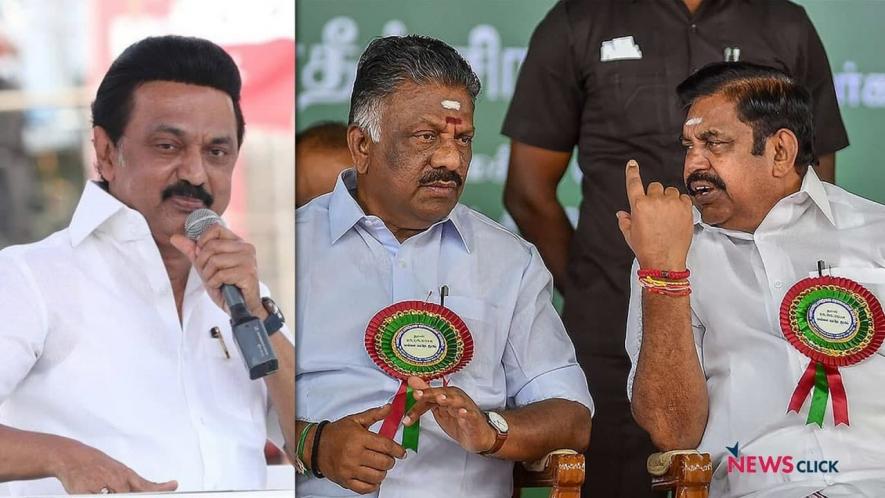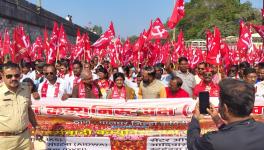TN: In Over 2 Months, DMK Govt Makes a Good Start in Face of Pandemic, But Challenges lie Ahead

Over two months after the Dravida Munnetra Kazhagam (DMK)-led state government took over office in the state, it has been receiving praise on various fronts. The handling of the second wave of the COVID-19 pandemic, induction of experts in the State Development Policy Council (SDPC), constitution of the State-Level Vigilance and Monitoring Committee (SVMC) and some people-centric measures have captured the attention of the general public and political commentators.
However, the M K Stalin-led government’s sustainability will be under scrutiny, as environmental issues and urban development still remaining the key challenges. All eyes will also be on whether several poll promises are fulfilled in the months to come. Amid all this, the relations between the DMK government and the Centre will be keenly watched.
The principal Opposition party, the All India Anna Dravida Munnetra Kazhagam (AIADMK), on the other side, is yet to get its act together. The intervention of V K Sasikala, the former aide of late chief minister J Jayalalitha, seems to have paved the way for the warring Edappadi K Palaniswami (EPS) and O Panneer Selvam (OPS) factions to strike a compromise.
‘COUNTERING THE PANDEMIC SUCCESSFULLY’
The swearing in of the DMK government coincided with the second wave of the pandemic. Shortage of medical oxygen, oxygen beds and ICU beds dominated the initial weeks of the new government's agenda. The government was credited for acting swiftly to add more beds in government hospitals to cater to patients when the second wave hit the state hard.
“The effective handling of the second wave of the pandemic is the biggest success of the DMK-led government”, A Saravanan, spokesperson of the DMK claimed.
The government also received praise for installation of new oxygen plants, roping in industries to install and generate oxygen for medical needs and addition of new beds for COVID-19 treatment.
“There were no deaths in the state due to shortage of oxygen, as stated by the health minister, as testimony to the performance of the government in a very short time”, added Saravanan.
However, several reports of deaths in hospitals and protests by family members were reported in May allegedly due to shortage of oxygen.
To overcome the increasing demand for oxygen, the state government announced the incentivisation of oxygen production.
“Medical infrastructure was expanded after meticulous planning and is not being dismantled. The state is well prepared in the event of a third wave”, he added.
PERFORMANCE ON MULTIPLE FRONTS
The DMK, which is highlighting the state government’s performance in the first two months, said a few of its poll promises have also been fulfilled. Free travel for women and transpersons in mofussil buses, one-time distribution of Rs 4,000 and grocery kits as COVID-19 relief to the ration card holders are some of the measures taken.
“In spite of tough financial conditions, the DMK government has ensured the implementation of a few poll promises. Reservation of 75% jobs for Tamils will also be implemented shortly. The budget will be a precursor of things to come in the next five years”, Saravanan added.
The appointment of experts to the SDPC was welcomed by political parties and policy makers alike. For the first time, a transgender, Narthaki Natraj was also inducted in the committee.
The government also reconstituted the SVMC as per the SC/ST (Prevention of Atrocities) Act, by accommodating members of Assembly and Parliament from the Scheduled caste and tribe communities to the committee.
The leader of Viduthalai Chiruthaigal Katchi and MP, Thol Thirumavalavan, welcomed the decision on the long-pending demand on the formation of SVMC, and has insisted that the committee meets twice every year as mandated by the law.
The government also signed 35 memoranda of understanding (MoU) with investments of Rs 35,000 crore and 55,000 possible employment opportunities. The government and the industries department now have their task cut out in ensuring the implementation of these MoUs.
ENVIRONMENTAL AND URBAN CHALLENGES
The handling of environmental issues and urban development will be of keen interest in the years to come. The increased pollution in Chennai, as NO2 levels have increased by 94%, as compared to the levels in 2020, has rung alarm bells. Several organisations have been flagging rising pollution in Chennai and other parts of the state, including Thoothukudi and Gummidipoondi.
On the plans of the state government and the Greater Chennai Corporation (GCC) to beautify the city, G Sundarrajan of Poovulagin Nanbargal (Friends of Nature), tweeted that banning posters, cleaning debris and relaying walk paths does not amount to beautification.
“People of Chennai, especially North Chennai live 24/7 in one of the most polluted regions in the world. There are about 12 lakh lung disease patients in Chennai. Take citizens on board and move on. Already we have spent millions in the name of beautification”, he added.
The ‘beautification’ process also affects slum dwellers, since employment and education after being resettled in faraway places outside Chennai hits them hard. It may be recalled that The 'Singara Chennai' (Beautiful Chennai) project was initiated by Stalin, when he was mayor of Chennai in 2010.
The pandemic had a tough impact on relocated slum-dwellers as restrictions on travelling to work and social stigma affected their income badly. The smart city project has also favoured the elite while the marginalised have been left to suffer, say critics.
UNFULFILLED PROMISES
Though these are still early days, there are several poll promises by DMK that need to be fulfilled. Among these are, reduction in the prices of petrol and diesel while announcing a subsidy for LPG cylinders.
Though the AIADMK and Bharatiya Janata Party (BJP) have already started questioning the DMK government on ‘non-implementation’ of its promises, finance minister, PTR Palanivel Thiyagarajan, hit back and blamed the Union government for rising fuel prices and rejected the possibility of reducing the prices immediately.
“Our other poll promises will be implemented as soon as the financial conditions of the state improves since the second wave of the pandemic has had a huge impact on the revenue”, Saravanan added.
The DMK also promised to scrap the national eligibility-cum-entrance test (NEET) in its manifesto, which seems a herculean task. Once again, the AIADMK has got a chance to attack the government on its ‘failed’ promises, even as the party itself is being battered internal squabbles after its poll debacle. It even held protests against the DMK-led government, with both EPS and OPS alleging criticising the DMK government.
AIADMK YET TO REGROUP
The AIADMK, despite a respectable performance in the Assembly elections, remains a divided house. The difference of opinion between EPS and OPS seems far from over. The looming threat of former party supremo J Jayalaithaa’s aide V K Sasikala to re-enter politics remains a threat for the dual leadership.
But, as Jeeva Sagapthan, a political commentator, observes: “The political future of Sasikala depends on her position against the BJP”. The AIADMK and its leadership has moved closer to BJP since the death of Jayalalithaa. In fact, several AIADMK leaders have blamed the alliance with BJP for the party’s poll defeat, even as the top leaders remain staunch BJP loyalists.
EPS and OPS even met Prime Minister Narendra Modi and home minister Amit Shah, claiming that they insisted that the demands of Tamil Nadu be met, including the issue relating to the Mekedatu project proposed by Karnataka.
K Balakrishnan, state secretary of the Communist Party of India (Marxist), however, said “the two leaders are visiting BJP leaders to settle their internal feuds. It has nothing to do with the interest of the people of the state”.
So far, OPS has been silent on Sasikala’s actions, saying that, “No individual can capture AIADMK”, the day after his Delhi visit. The statement, in a way, indicates the purpose of the visit of these two leaders to Delhi.
Meanwhile, the AIADMK suffered another setback as the state government agreed to inquire into the complaint alleging corruption in mining, submitted by Pattali Makkal Katchi (PMK) in 2015, its current alliance partner.
With several former AIADMK ministers facing graft charges, the party may find the going tough. The AIADMK leadership has alleged the raid on the former transport minister by the directorate of vigilance and anti-corruption (DVAC) as “politically motivated.”
Overall, how the political scenario in Tamil Nadu unfolds in future will depend on whether DMK is able to sustain the good start it has made and meets the challenges ahead, as also what shape the AIADMK takes in future if it will be able to regroup and come back strongly with a united face to challenge DMK.
Get the latest reports & analysis with people's perspective on Protests, movements & deep analytical videos, discussions of the current affairs in your Telegram app. Subscribe to NewsClick's Telegram channel & get Real-Time updates on stories, as they get published on our website.
























